Aston Martin has announced a reduction in vehicle shipments to the United States as it seeks to cushion the financial impact of new auto tariffs introduced by President Donald Trump. Despite the move, the British luxury carmaker has maintained its full-year outlook, even as it reported a 13% year-on-year decline in first-quarter revenue and a pretax loss of £79.6 million ($107 million).
The decision to limit deliveries to the U.S., Aston Martin’s largest regional market, accounting for over a third of its revenue, aims to manage rising import costs and address existing dealer inventories. In Q1 2025, the company shipped 319 units to the U.S., a 5% increase compared to the same period last year. However, the average selling price fell by 15% to £216,000, primarily due to fewer hypercar sales. When excluding these top-tier models, average prices actually rose by 10% to £193,000.

CEO Adrian Hallmark continues to implement a cost-reduction strategy under a broader financial turnaround plan spearheaded by Executive Chairman Lawrence Stroll. Since 2020, Stroll’s Yew Tree consortium has invested more than £600 million in the company. Recent efforts include a £52.5 million capital injection and plans to sell Aston Martin’s Formula One stake for at least £74 million. Despite these measures, shares have fallen 35% since the start of the year.
The new U.S. tariffs are also affecting other UK-based carmakers. Jaguar Land Rover, for example, temporarily suspended exports to the United States in April. Aston Martin, which does not produce vehicles in the U.S., had earlier warned of limited growth in 2025 and anticipated price increases in the American market. Further strain on profits came from a £15 million investment to improve in-car software systems.
While Stroll has criticised the company’s current public market valuation, calling it a “joke,” he clarified that there are no immediate plans to take Aston Martin private.
AUTO TECH | Global Carmakers Turn to Chinese Tech for Smart Car Features





